Democratic Republic Of Congo
The post-election process in the Democratic Republic of Congo (DRC) is getting quite messy as more local, regional and international voices discredit the results of the presidential vote.
The African Union on Thursday became the latest international body to ask DRC’s government to consider canceling the results of the December 30 vote, which was won by opposition candidate Felix Tshisekedi.
Martin Fayulu, another opposition politician has petitioned the Constitutional Court, requesting a recount of the poll. Fayulu says he won by a landslide and accuses Tshisekedi of striking a deal with President Joseph Kabila to be declared the victor.
Provisional results by DRC’s electoral body, CENI showed that Tshisekedi got over seven million votes representing over 38% of valid votes cast, while Fayulu came in second with about 35%.
Fayulu says he won the election by 61%, and there are many that believe him.
In this article, we look at all the individuals and organisations that have backed Fayulu, once described as a little-known member of parliament hoping to replace Kabila. Tshisekedi and Kamerhe
When the opposition announced Fayulu as their joint candidate under the Lamuka coalition in November last year, many expressed surprise because he was picked ahead of Tshisekedi, president of the historic opposition party (UDPS).
Indeed, president-elect Tshisekedi and his running mate Vital Kamerhe, were among the very first people to put their faith in Fayulu as the most suitable candidate to lead DRC after 18 years of Kabila’s reign.
Tshisekedi, Kamerhe and Freddy Matungulu Mbuyamu agreed to set aside their candidacies in favor of Fayulu’s presidential bid.
The united opposition was quickly shattered after supporters of Tshisekedi and Karmehe protested, leading to the candidates’ withdrawal. They went ahead to form what they described as the ‘winning ticket’.
READ MORE: DRC Coalitions birthed in Geneva and NairobiThe rejected candidates
Fayulu was also backed by candidates whose own presidential ambitions had been frustrated by Kabila’s government.
Kabila’s ex-vice-president, Jean Pierre Bemba, former governor of Katanga Province, Moise Katumbi and Adolphe Muzito whose attempts to register for the presidential election were unsuccessful, were part of the signatories of the Lamuka coalition.
Fayulu’s campaign team included allies of Bemba and Katumbi in key positions, as he hoped to win electoral support in Katumbi’s stronghold of Lubumbashi.
Bemba’s experience and voter base would also be vital, considering that he contested against Kabila in 2006, garnering 20% of the votes cast in the first round.
READ MORE: Kingmakers behind ‘little-known’ candidates in DRC pollsKoffi Annan Foundation
The Lamuka coalition agreement that announced Fayulu as the opposition leader was reached after talks in Geneva under the auspices of the Kofi Annan Foundation.
The Foundation explained in a statement posted on its website that the facilitation was part of the electoral mediation work that it performs around the world.
The Geneva meeting in November followed another meeting in South Africa, where the opposition parties agreed to name a joint candidate.
Details of the Geneva meeting that birthed Fayulu’s Lamuka coalitionDRC’s powerful Catholic Church
Following the proclamation of provisional results that favoured Tshisekedi over Fayulu and Shadary, the Catholic Church issued a statement that cast doubts over the credibility of the election outcome.
The church said results announced by the elections board, CENI, did not match with tallies it had obtained through its observers deployed throughout the country.
While the Catholic Church did not mention who the winner was according to their tallies, it is widely believed to be Fayulu who has since called upon all observers to publish their own figures.
The church called on the United Nations to ask CENI to release records of vote-counting at all polling stations to allow for verification.
The church, which consistently called out Kabila’s government for human rights violations and mediated political agreements to maintain stability, wields considerable power in a country where over 90% of the population identify as Christians.
From the West with love (France, Belgium, UK, US)
Tshisekedi’s victory was also questioned by France and DRC’s former colonial master, Belgium.
Hours after CENI announced provisional results, France’s foreign minister Jean-Yves Le Drian said his country believes Fayulu won the election.
“It really seems that the declared results … are not consistent with the true results,” he told France’s CNews channel.
“On the face of it, Mr Fayulu was the leader coming out of these elections.”
Belgian Foreign Minister Didier Reynders also cast doubt on the election result, saying his country would petition the UN Security Council to seek clarification about Tshisekedi’s surprise victory.
“We have some doubts that we need to check and which will be debated in the coming days in the Security Council,” Reynders told Belgian public broadcaster RTBF.
The United Kingdom and the United States also sought clarity over the provisional results issued on January 10.
US had earlier warned CENI to ensure that announced results correspond to results announced at all polling stations.
‘‘Those who undermine the democratic process, threaten the peace, security or stability of the DRC, or benefit from corruption may find themselves not welcome in the United States and cut off from the U.S. financial system.’‘
READ MORE: U.S. hails Congolese voters, warns CENI, cautions ‘rogue’ politicians‘Unprecedented’ support from African countries
Fayulu’s bid to have Tshisekedi’s victory nullified and obtain a vote recount order from the constitutional court, has also been backed by several regional African blocs.
The Southern African Development Community (SADC), the International Conference of the Great Lakes Region (CIRGL) and the African Union (AU) have all called upon authorities in DRC to conduct a recount.
“We suggest that the competent structures consider counting the votes in order to guarantee the transparency of the results,” CIRGL said in a statement.
“A recount would provide the necessary reassurance to both winners and losers,” SADC said in a statement.
While the SADC on Thursday backtracked on its call for a recount, asking the international community to respect the Congolese electoral process, the AU on the same day issued a rare statement asking DRC to suspend the results announced by CENI.
“The Heads of State and Government attending the meeting concluded that there were serious doubts on the conformity of the provisional results as proclaimed by the National Independent Electoral Commission, with the verdict of the ballot boxes,” it said in a statement.
READ MORE: DRC rejects AU demand to delay election resultsWho is Fayulu?
62-year-old Fayulu is the president of the opposition party Commitment for Citizenship and Development.
Fayulu, who defended his credentials as a suitable opposition leader by saying he has ‘fought for Democracy’ in DRC for the past 30 years, has considerable support in Kinshasa, where he has on several occasions led anti-government protests.
- Member of Sovereign National Conference in 1991, campaigning for a multi-party democracy during Mobutu Sese Seko’s reign
- Worked with US-based oil company, ExxonMobil (1984-2003)
- Elected to parliament in 2006, 2011
- Launched his party in 2009
- Led several anti-government protests in 2016 and 2017
An opinion poll published in December showed that Fayulu had become the clear favourite to win with 44%, ahead of Tshisekedi (23%) and the government-backed Emmanuel Ramazani Shadary (18%)
“Fayulu … is the clear favorite to win elections if they are free and fair,” Congo Research Group (CRG), which commissioned the polling on which the survey was based, said in a statement.



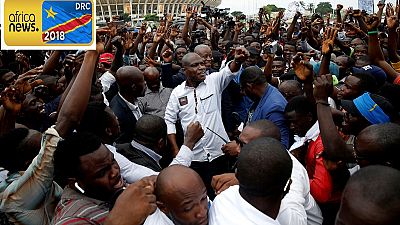

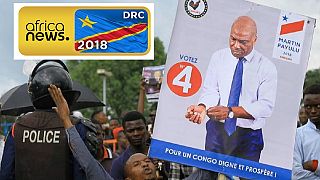
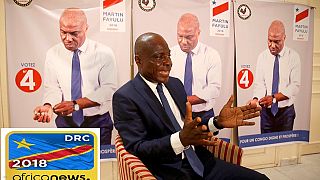
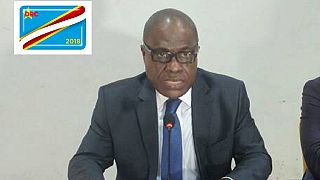
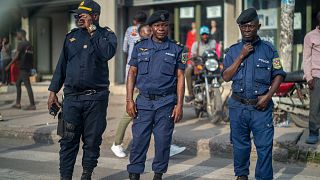
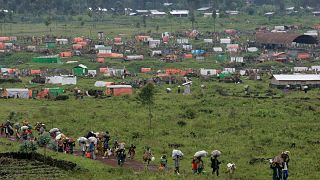




01:21
Cameroon 2025: Maurice Kamto seeks to vie on a different political outlook
01:04
Turkish democracy under pressure: Erdogan's top rival sentenced to two years in prison.
01:52
Togo’s security forces cast early votes ahead of high-stakes municipal elections
02:23
Cameroon: Mixed reactions in Yaoundé after Biya announces bid for another term
00:56
Peace talks between DRC and M23 rebels 'moving in the right direction'
01:01
Trial of DRC's former Justice Minister Constant Mutamba postponed for two weeks